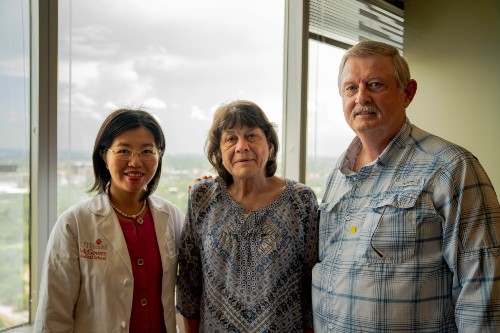
In January 2016, Bonda Byerly’s family physician took one look at her and asked if her husband was with her, so certain was he that she was in dire health.
At the time, the (then) 60-year-old East Texas resident had just retired from her job of 33 years in accounting at an electrical co-op. She and her husband, also retired, had just sold their 100-acre homestead with cattle and were building a house on 4 acres on the shores of Lake Sam Rayburn.
“I was really dragging but I thought I was just burnt out,” she says. “Finally my husband said, ‘You need to go get checked out.’”
Her physician asked her some questions and noted jaundice in her eyes and skin. Hours later a CT scan revealed a 5-centimeter tumor obstructing her pancreatic and bile ducts. A stent was placed as a temporary life-saving measure, and she was referred to Memorial Hermann-Texas Medical Center for further evaluation and treatment.
Two weeks later, J. Steve Bynon, MD, professor of surgery at McGovern Medical School at UTHealth Houston, who is affiliated with Memorial Hermann TMC, performed a procedure known as the Whipple procedure (also known as a pancreaticoduodenectomy) on Byerly. During the complex 5-hour surgery, Dr. Bynon removed and reconstructed a large portion of Byerly’s gastrointestinal tract.
“We removed the gallbladder, the head of the pancreas, the first part of the small intestine (the duodenum), the bile duct and surrounding lymph nodes,” says Dr. Bynon. “Afterward, pathology confirmed clean margins in the surrounding tissue. Four lymph nodes tested positive for cancer. Given the size of the tumor and the metastasis to surrounding lymph nodes (but not to distant organs), the diagnosis was Stage III pancreatic cancer.”
According to the American Cancer Society, pancreatic cancer is the third leading cause of cancer death in the United States and has the lowest relative survival rate of all major cancers. The 5-year survival rate for pancreatic cancer (all stages) is 10%.
As Dr. Bynon explains, “Treatment options for pancreatic cancer include chemotherapy, radiation and surgery; however, surgical removal of the tumor is only possible in 20% of cases. And many patients who undergo surgery cannot complete their therapy (chemo) due to complications related to surgery. But for patients with localized disease who can complete therapy (surgery plus chemo), the 5-year survival rate is 39%.”
While in the hospital, Byerly was visited by medical oncologist Putao Cen, MD, associate professor of oncology at McGovern Medical School at UTHealth Houston, who is affiliated with Memorial Hermann. Dr. Cen explained that with surgery alone, the recurrence rate of metastatic pancreatic cancer is greater than 90%. Dr. Cen prescribed a special 6-month chemotherapy regimen designed to treat Byerly’s specific type of cancer.
“Chemotherapy is a very important part of treatment to prevent recurrence of this type of cancer,” says Dr. Cen. “But because pancreatic cancer cells are heterogenous, we combined four to five different agents across two different regimens to offer a broad spectrum of coverage. And since treating Mrs. Byerly, we’ve added even more agents and we’re using even more advanced technologies, testing each individual’s cancer genomic information, to diagnose and treat these patients.”
In January 2021, Byerly celebrated her 5-year milestone. There is no evidence that her cancer has returned.
“For patients diagnosed with pancreatic cancer, it’s important to get treatment at a center that involves all of the disciplines required and, most important, has the surgical expertise—low complication rate with complete resection of the tumor—to obtain the best results,” says Dr. Bynon. “Our goal is to put patients, such as Mrs. Byerly, on the positive side of the 5-year survival rate.”
Learn more about Memorial Hermann’s services to diagnose and treat pancreatic cancer »
Contact Us
For more information about Memorial Hermann Cancer Centers, including how to get connected to our support services or an affiliated provider, please call (833) 770-7771 or fill out the form below to be connected to one of our Oncology Nurse Navigators.